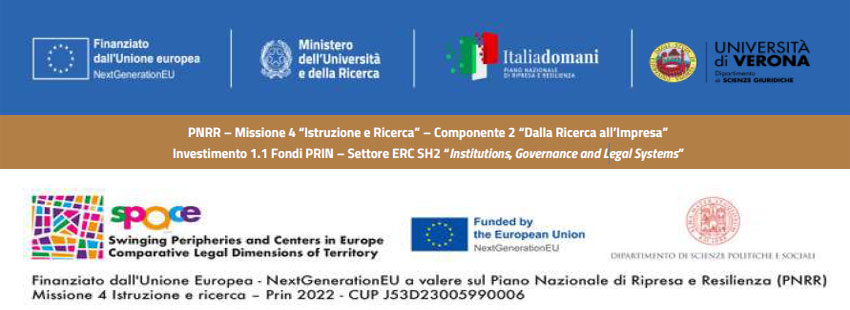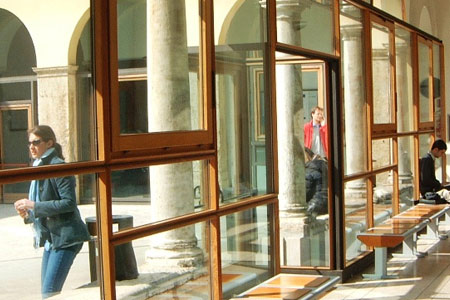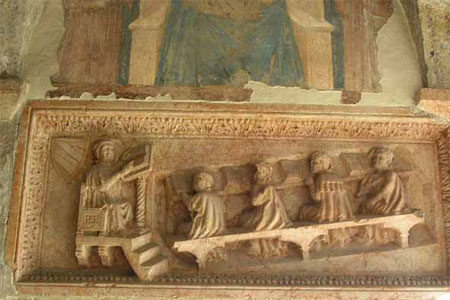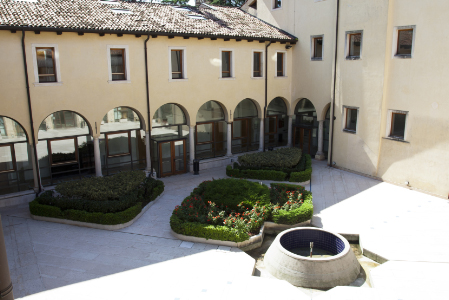
Deadline for applications: 30 October 2024
Description
The Winter School Explorations in Critical Legal Geographies aims to bring together PhD candidates and young academics with a variety of backgrounds (legal, geographical, political, sociological, anthropological, urban studies, and so on) in the intriguing and pluralistic field of critical legal-geographical debates.
The WS Explorations in Critical Legal Geographies is an intensive three-day program taught in English providing a comprehensive critical approach and an interdisciplinary understanding of the different issues, topics, and methodologies that populate this intriguing field of research.
It is conceived to reflect on methodologies, discourses, theories, and practices characterising the legal-geographical entanglement.
Participants will engage in a conversation with CLG scholars to discuss the intertwining of space and law through inclusive and dialogical methodology, as well as relaxed discussions stimulating exchange of ideas.
Activities
The WS consists of three days of lectures, discussion groups, and methodological workshops in dialogue with scholars that have been making research in this field for a while.
Its aim is to explore the methodological toolkit (e.g. interdisciplinary research), the epistemological approaches (e.g. ‘what are critical legal-geographical studies?’), and both traditional and hot topics in the field.
To facilitate communication and debates, it will have an interactive format. PhD students are therefore expected to actively take part in the WS.
Teaching activities will be delivered by a network of international scholars (the members of the steering committee, together with invited speakers) often engaged with doctoral courses, who have voluntarily set up this PhD learning project.
The school is organised around the following main teaching activities:
#Keywords
These lectures are engaging conversations about core themes and topics of CLG. Participants will be introduced to critical legal geographies, its epistemological paradigms and worldviews, and traditional/hot topics. CLG scholars will discuss the topics with attendees by using their own research as the starting point.
#Perspectives
These interactive lectures tackle CLG as an intellectual (and interdisciplinary project). Each CLG has their own monodisciplinary background, and this unavoidably affects the way they do critical legal geography.
It will also assess critical legal geographies by presenting the different (legal, geographical, socio-political) perspectives implicated in the field and that make up a pluralistic mosaic and a complex web of relationships crossing disciplines.
The lectures thus address a state of mind that is widespread among young (monodisciplinary) scholars: what does it mean to be a lawyer/geographer/political scientist within CLG? How can CLG benefit from my monodisciplinary background? Is it really “added value” in interdisciplinary research?
#Open Discussion
The WS will include several moments where PhD students will have the opportunity to present and discuss their research topics. These discussions will be organised in small groups to facilitate interaction and horizontal communication.
#Publishing scientific articles and books in the field of legal geography
Questions related to problems, opportunities and strategies about publishing in the field of critical legal geography will be addressed in this section
#Social Events and Networking
The workshop also offers PhD students a valuable opportunity to build and enhance their professional networks within the field of critical legal geography. Participants will have the chance to connect with peers, engage with mentors, and foster relationships with others who share similar academic interests and research goals.
Languages
How can we conceptualize critical geographies in their plurality? Pluralism is particularly valued within CLG studies. Although activities and lectures will be held in English, we seek to enhance collaboration between different traditions of thoughts and methods and encourage ways of mediating, translating and traversing academic cultures.
One important aspect hereof are linguistic fields and their significance on the way we conceive of our objects of study and of critical legal geographies.
In this spirit, applicants are encouraged to submit (and present) their working papers/abstracts in English, French, Italian, and Spanish. During the “open discussion” moments, we also welcome presentations in these languages to elicit exchanges and translations, whilst remaining aware of the limits of translations, of our own conceptual embeddedness, cultural logics and disciplinary boundaries at play in our linguistic fields
How to Enroll
Deadline for applications: 30 October 2024
Number of attendees accepted: 30
Fee: 200€. The fee covers the participation costs, together with coffee breaks and lunches. Reduced participation fees will be offered to participants from universities located in the Global South or in areas of conflict.
How to apply: please, submit the following documents to matteo.nicolini@univr.it and giuseppe.rigobello@univr.it :
1) short bio (max. 300 words, including detailed information about disciplinary background and main research interests)
2) abstract of the doctoral thesis (between 700 and 1000 words).
Applications will be assessed by the Steering Committee of the Winter School. Notification of application acceptance will be published around 20 November.
How to enroll: All admitted candidates will be required to confirm their participation by the 8th of December, by paying the registration fee. They will also be required to deliver a short essay (6000 words max.) related to their doctoral research by 15 December 2024. This essay will be presented and discussed at the Winter School during interactive sessions. Submission of the essay is therefore mandatory for participation in the Winter School. Detailed information in this regard will be sent to all participants in due course.
Invited Speakers
Philip Hubbard - King’s College London
Professor of Urban Studies
Andreas Philippopoulos-Mihalopoulos - University of Westminster
Director of the Westminster Law & Theory Lab
Organisers
Directors: Matteo Nicolini (University of Verona), Francesco Chiodelli (University Turin)
Local Organising Committee: Matteo Nicolini (University of Verona) Giuseppe Rigobello (University of Verona)
Steering Committee: Hadeel Abu Hussein (Utrecht University); Marco Allegra (Lisbon University); Voltaire Alvarado (University of Concepción); Nufar Avni (Hebrew University of Jerusalem); Tugba Basaran (University of Cambridge); Francesco Chiodelli (University of Turin); Alexandre Kedar (University of Haifa); Isabella Leroy (Vrije Universiteit Amsterdam); Gail Lythgoe (University of Edinburgh); Giulia Massenz (Polytechnic University of Turin); Elya Milner (Technical University of Berlin); Daniela Morpurgo (Polytechnic University of Turin); Matteo Nicolini (University of Verona); Mara Ntona (University of Strathclyde); Jae Page (University of Toronto); Andrea Pavoni (University Institute of Lisbon ); Giacomo Pettenati (University of Eastern Piedmont); Benjamin Ralston (University of Saskatchewan); Sallie Yea (La Trobe University, Australia)









